
Do we have a challenger to Glenn Colquhoun as physician-poet with Art Nahill? I don’t think so, as ultimately we judge a poet by what he writes, not how he makes a living. Yet there are some similarities in the strength of the writing and the singularity of Nahill’s observations.
His poems keep emotion in check through the cool detachment of his words and phrases, which invite the reader to pay careful attention to what is being said by how it is being said. To me this made it seem that the core and essence of each poem is poised for delivery and awaiting our response to what’s enfolded deep within.
I like this as a process in writing and especially in poetry. Nahill’s ‘Poem From a Shopping List Left Accidentally in My Notebook’ was a particular favourite. I can imagine it inspiring other responses to the accidental and incidental; as a workshop exercise, even. I learned on my degree course that where the best poetry comes from is unimportant; it is where it ends up. I also discovered that you can read a good poem over and over, take it apart and forensically put it together again and lo! when you are done, read it again and it still works.
In case you have misunderstood me, I am not saying there is no emotional content in his poetry. I firmly believe that discipline is not the enemy of creativity – and we are talking about a poet who is both creative and disciplined. I also believe that, to convey an emotion accurately and allow the reader to respond to it, the poet has to step back, as it were, and deliberately underplay intensity.
Because readers of poetry always bring something of their own to a poem that engages. This is often a poem they identify with – and I responded in this manner to so many of Nahill’s that I almost feel this is a man I know and who knows me. Fancy, perhaps; but reading some of his poems that cover ‘the ordinary human existence’ (which never is ordinary to a poet) I identified deeply with their subject.
If you want examples, try ‘Neighbourhood,’ ‘Memento Mori,’ ‘Loneliness’ and ‘Insomnia.’ There is a truth and sadness in them that lightens me as I read. I, too, the poet sings, have experienced your pain. Metaphor becomes a metaphysical link between the writer and the reader.
Overall, however – and there wasn’t a single poem that lacked interest – it is the strength of his writing that won me over. Nahill is firmly a poet of the here and now, but his poems wander off into the past and elsewhere – geographically, emotionally and intellectually. In ‘Emigration’ he reminds us that:
‘... we are not so much citizens
as itinerants following
the harvest of loss
and acquiescence
always carrying some form
of faded identification
to remind ourselves
who we were
before we settled
for this temperate life.’
I liked the challenge of reading A Long Commute Home and know already I want to return to it some time soon. I don’t think it will be lonely or sleepless on my bookshelf.
Publisher: Art Nahill (via Mary Egan Publishing), ISBN 978-0-473-27070-4
Available in print through the Author’s blogsite Two Hemispheres Poetry, twohemispherespoetry.blogspot.co.nz, and in eformat via Amazon.com, Smashwords.com and Apple iBooks

 RSS Feed
RSS Feed
